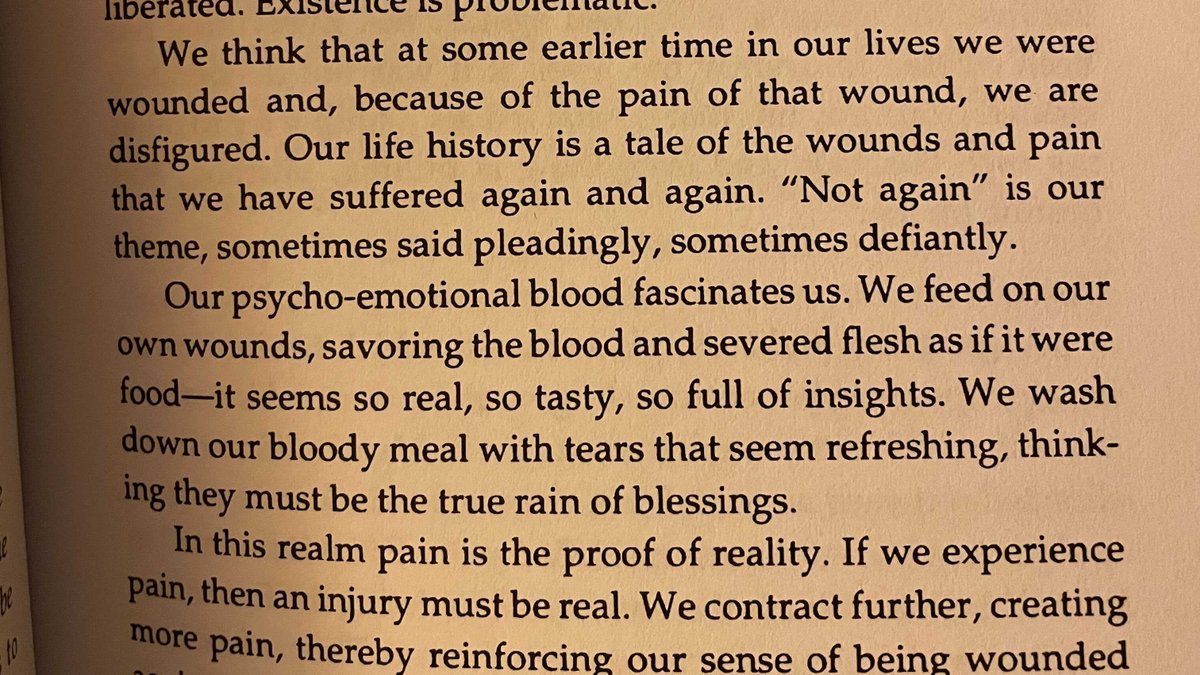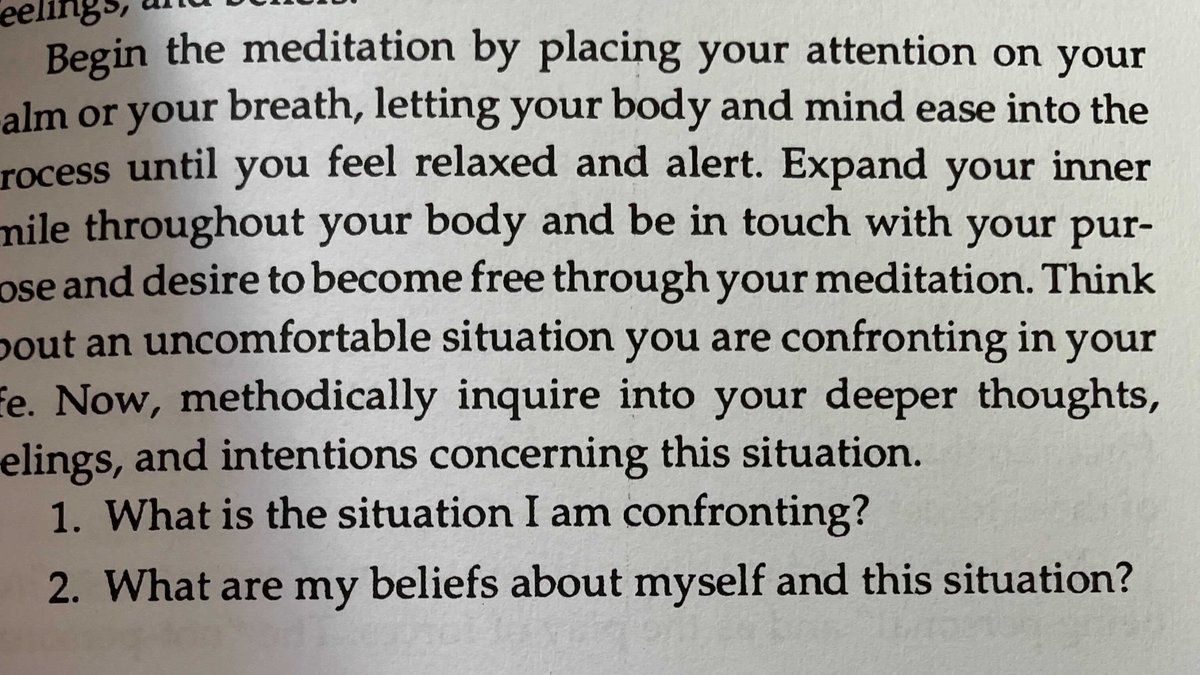okay here we go - some summary + some of mine own thoughts https://twitter.com/yung_shishtov/status/1331122568904855553?s=20
so the book focuses on the 6 realms of existence/rebirth (i.e. samsara) and explains ways in which each realm perpetuates and fixates on different types of suffering, plus some antidotes. I found the descriptions of typical behaviors and thought patterns in each realm v on point
realms:
1) animal - territory, danger, comfort
2) hell - anger, righteousness, and sense of victimization
3) hungry ghost - insufficiency, craving
4) titan - struggle, envy
5) god - pride, indifference, self-infatuation
6) human - certainty, possession, planning
1) animal - territory, danger, comfort
2) hell - anger, righteousness, and sense of victimization
3) hungry ghost - insufficiency, craving
4) titan - struggle, envy
5) god - pride, indifference, self-infatuation
6) human - certainty, possession, planning
1) in the animal realm we're concerned with setting boundaries and avoiding discomfort. hoping that if we can get away from the bad and only have good, we'd be free. we long for connection and feel vulnerable but don't reach out or open up to others bc we fear the contact
withdrawing and becoming a hermit, not realizing how interdependent everything is becomes paramount.
as per the name, this realm seems the deepest / most tied to childhood experiences/trauma. it's mostly based in fear and stimulus response mechanisms.
as per the name, this realm seems the deepest / most tied to childhood experiences/trauma. it's mostly based in fear and stimulus response mechanisms.
the realization that boundaries are fluid/relative and also indicate connections is one of the antidotes here. instead of hiding and withdrawing, we see that we can host others within our community. also, noticing the pauses which are inherent in any stimulus/response mechanism
i think this realm is also "first" in the sense that without reflection about anything being wrong, it seems (at least for me) this is a default mode. not only is the territorialness physical, but we also erect boundaries around parts of our psyche we want to avoid
this realm seems most obviously related to IFS-type work, trauma work (e.g. Peter levine), and UtEB. the contraction and withdrawal is often physical too
2) hell realm - this is the realm of anger, blame, and the victim mindset. something is wrong with us, we were wounded at some point and now have to fix ourselves. we continue to contract and be aggressive towards any pain.
amazing line here "so full of insights"
amazing line here "so full of insights"
the hell realm seems like a natural next step as once one has admitted that something is wrong - you start to think of yourself as broken and become aggressive towards what happened that made one this way. https://twitter.com/yung_shishtov/status/1246574440759980032
pre-occupation with the causes of what happened can lead to stuckness here. "if only i could figure out what happned/why/how/what if" but things are v complicated and not monocausal! (insert taleb) even if you did figure it out, how would that help?
one can become addicted to bad feelings and the sense of righteousness/blame that comes along with them
i found "courage to be disliked" to be a really helpful antidote here. there's a way in which personal responsibility is very necessary/important
i found "courage to be disliked" to be a really helpful antidote here. there's a way in which personal responsibility is very necessary/important
3) the hungry ghost (or preta) realm - this one fucked me up
marked by a constant craving, desire, and inadequacy. one tries to find meaning/satisfaction through the satiating of desires.
"if only, what should have been, could have been"
marked by a constant craving, desire, and inadequacy. one tries to find meaning/satisfaction through the satiating of desires.
"if only, what should have been, could have been"
this realm seems v much like the "having mode" (vs. the being mode) as vervaeke describes it. the world becomes a commodity to be consumed, one becomes preoccupied with the next thing to be done/bought/had/finished
the sort of "typical" view of what meditation/buddhism teaches (i.e. letting go of craving) seems most applicable here
also realizing that one's self-worth/adequacy/value does not come from the external world but rather just is
also realizing that one's self-worth/adequacy/value does not come from the external world but rather just is
4) titan realm - marked by the compulsion to prove ourselves by accomplishing things, being successful, and becoming gods. this one feels the most like modernity to me (at least corporate-world capitalist types)
like the other realms, there is a deep shame, lack of self-worth, and self-comparison that marks this realm. but rather than withdrawing, one leans into competition and struggle in order to prove oneself. reminds me of the "chip on the shoulder" trope
one becomes a warrior for perfection and tries to affirm worth through struggle and accomplishments (productivity/hustle porn). if only i could be better/faster/stronger, than i can control my environment and validate myself
antidotes prescribed here are noticing of harmony of spaciousness as well as really fully feeling emotions rather than contracting around them. i did like this inquiry into one's aspirations. noticing whether one is driven by fear/anger/desire for control feels important
okay this thread is getting much longer than i planned but too deep now to stop
5) the god realm - "spiritual materialism", comfort, avoidance of real life to stay in one's good feelings
any bad feelings are to be avoided bc they are not part of the plan. one becomes addicted to good feelings, pleasure and experiencing (bc that won't result in pain/loss)
any bad feelings are to be avoided bc they are not part of the plan. one becomes addicted to good feelings, pleasure and experiencing (bc that won't result in pain/loss)
it's interesting, this one seems very similar to the animal realm but "transcended" - we still optimize for comfort and withdraw but in a different way. also is very much a next step from some of the other realms. one realizes that one can avoid suffering in various ways
the book says surrendering to one's attainments and leaning into delight/wonder of the unknown is an antidote here
i would also add less experiencing and more building, skin in the game, taking risks, etc. is important. being a part of the world
i would also add less experiencing and more building, skin in the game, taking risks, etc. is important. being a part of the world
6) the human realm - preoccupation with possession, concepts, finding understanding in everything.
reminds me of scientism, rationalism, humanism
we want to own our own experience and control it, make it legible to ourselves and others, assign meanings everything
reminds me of scientism, rationalism, humanism
we want to own our own experience and control it, make it legible to ourselves and others, assign meanings everything
this one is perhaps too left hemisphere in mcgilchrist's model
we bind life by making plans, maps, histories, agreements, rules, organization, etc. AND we are much more attached to these than to life itself
everything must have and be assigned a meaning/explanation
we bind life by making plans, maps, histories, agreements, rules, organization, etc. AND we are much more attached to these than to life itself
everything must have and be assigned a meaning/explanation
in this realm one becomes pre-occupied with one's personal mythology and trying to explain/find meaning in past experiences to explain one's current situation. reflecting on one's bad isn't bad in of itself, but when one becomes fixated on it and how it applies to the self
i feel particularly attacked by this realm because many of the mindsets seem good to me (and i think they are), but they trap us when we become overly-fixated or attached to them rather than reality, and thus dissociate from reality.
"a picture held us captive"
"a picture held us captive"
this realm feels a bit like the "last stop" that can only be transcended with more spiritual-like inquiry. also important point that failures and successes in this realm easily lead to others as one becomes fixated on various things
the book (obvs with the title) advocates for opening the heart which will open us to compassion and then freedom. we not only open the heart center but also find the essence of compassion, true understanding and concern for the wellbeing of others instead of concern for ourselves
while i think there are ways in which each realm feeds into the other, different realms also seem to apply to different experiences (ime). like i have experiences i relate to which feel very hungry ghost, others titan, and others human.
one of the reasons i liked this book i think is because is really demonstrates how different/almost opposite various parts of the path may be. e.g. the way of of the god realm may be what's keeping someone stuck in the titan realm (ofc merely similar vs. the same)
some underlying dynamics of all the realms:
- sense of self-worth tied up in something else
- desire for control
- lack of responsibility - blame, guilt
- avoidance of some aspect of life
- need to prove oneself
- sense of self-worth tied up in something else
- desire for control
- lack of responsibility - blame, guilt
- avoidance of some aspect of life
- need to prove oneself

 Read on Twitter
Read on Twitter





